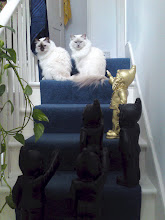Occupational health is a window on the world, I cannot prescribe drugs, nor order any tests but from my crow's nest I see life. Sometimes what I see disgusts me. No amount of appraisal, reappraisal, revalidation and 360 degree feedback will stop this awfulness happening, again, and again and again. Only doctors, nurses and people who selflessly care about patients can prevent these kind of tragedies.
45 year man blind, from avoidable and treatable complications of cataract surgery.
Street Sweeper - Essential manual worker
Aged 38, rapidly progressive cataracts and hypertension. Waits eighteen months for surgery "to get his blood pressure under control". Operations 4 and 6 months ago. Not back at work, sent for Occupational Health referral. On examination, Light and Dark perception only. Likely diagnosis - Bilateral detached retinas, occuring a few days after surgery. Complications - no post operative check, not even before he has surgery on his second eye
Prognosis - Blind for the rest of his life
The trivial
Technician (aka Mechanic) for top car manufacturer
Non essential Manual worker
Pains in wrist, not severe, just aches occasionally. Third visit to private specialists - and private physiotherapists, following checks for Hand and Arm Vibration Syndrome and Carpal Tunnel Surgery.
Unknown fact - this employee races 1,000 cc bikes at the weekend, which puts his wrists into extension and this, combined with the vibration and weight of the bike, is hurting his wrist. Complications - at risk of private surgery for Carpal Tunnel Syndrome
Prognosis - excellent if he changes the bars on his bike
Copyright (c) Dr. Liz Miller
http://www.drlizmiller.co.uk
Subscribe to:
Post Comments (Atom)













2 comments:
We could concentrate on minimising error, but would rather name a target and develop a technique to hit it.
Yes - the models developed by the aviation industry to minimise error might be a good start, see http://www.chfg.org/ as well as the Radio 4 "To err is human" that documents what happened to Elaine Bromiley
These might be contrasted with models from the fashion industry developed to sell style over content. As is widely apparent in the modern NHS.
Post a Comment